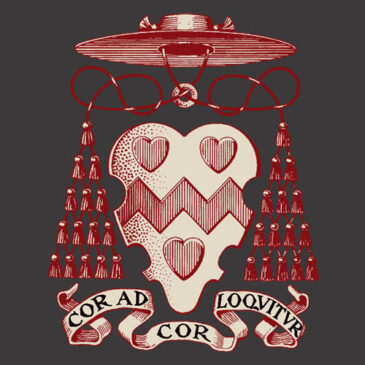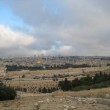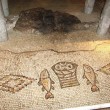 PPS IV, 3; preached, March 20th, 1836
PPS IV, 3; preached, March 20th, 1836
“Be sure your sin will find you out.” Numb. 32, 23.
This is one of those passages in the inspired writings, which, though introduced on a particular occasion and with a limited meaning, express a general truth, such as we seem at once to feel as being far greater than the context requires, and which we use apart from it. Moses warned the Reubenites and Gadites, that, if they, who had already been allotted their inheritance, did not assist their brethren in gaining theirs, their sin would find them out, or be visited on them. And, while he so spoke, He who spoke through him, God,
 O my God, holiness becometh Thy House, and yet Thou dost make Thy abode in my breast. My Lord, my Saviour, to me Thou comest, hidden under the semblance of earthly things, yet in that very flesh and blood which Thou didst take from Mary.
O my God, holiness becometh Thy House, and yet Thou dost make Thy abode in my breast. My Lord, my Saviour, to me Thou comest, hidden under the semblance of earthly things, yet in that very flesh and blood which Thou didst take from Mary.

 1. My Lord is gone up into heaven. I adore Thee, Son of Mary, Jesu Emmanuel, my God and my Saviour. I am allowed to adore Thee, my Saviour and my own Brother, for Thou art God. I follow Thee in my thoughts, O Thou First fruits of our race, as I hope one day by Thy grace to follow Thee in my person. To go to heaven is to go to
1. My Lord is gone up into heaven. I adore Thee, Son of Mary, Jesu Emmanuel, my God and my Saviour. I am allowed to adore Thee, my Saviour and my own Brother, for Thou art God. I follow Thee in my thoughts, O Thou First fruits of our race, as I hope one day by Thy grace to follow Thee in my person. To go to heaven is to go to My God, who could have imagined, by any light of nature, that it was one of Thy attributes to lower Thyself, and to work out Thy purposes by Thy own humiliation and suffering? Thou hadst lived from eternity in ineffable blessedness. My God, I might have understood as much as
My God, who could have imagined, by any light of nature, that it was one of Thy attributes to lower Thyself, and to work out Thy purposes by Thy own humiliation and suffering? Thou hadst lived from eternity in ineffable blessedness. My God, I might have understood as much as He has sent forth for the ministry of reconciliation, not Angels, but men; He has sent forth your brethren to you, not beings of some unknown nature and some strange blood, but of your own bone and your own flesh, to preach to you. “Ye men of Galilee, why stand ye gazing up into heaven?” Here is the royal style and tone in which Angels speak to men, even though these men be Apostles;
He has sent forth for the ministry of reconciliation, not Angels, but men; He has sent forth your brethren to you, not beings of some unknown nature and some strange blood, but of your own bone and your own flesh, to preach to you. “Ye men of Galilee, why stand ye gazing up into heaven?” Here is the royal style and tone in which Angels speak to men, even though these men be Apostles;  1. Thou, O Lord, after living a whole eternity in ineffable bliss, because Thou art the one and sole Perfection, at length didst begin to create spirits to be with Thee and to share Thy blessedness according to their degree; and the return they made Thee was at once to rebel against Thee. First a great part of the Angels, then mankind, have risen up against Thee, and served others, not Thee. Why didst Thou create us, but
1. Thou, O Lord, after living a whole eternity in ineffable bliss, because Thou art the one and sole Perfection, at length didst begin to create spirits to be with Thee and to share Thy blessedness according to their degree; and the return they made Thee was at once to rebel against Thee. First a great part of the Angels, then mankind, have risen up against Thee, and served others, not Thee. Why didst Thou create us, but PPS IV, 3; preached, March 20th, 1836
PPS IV, 3; preached, March 20th, 1836
 When our Lord came upon earth, He might have created a fresh body for Himself out of nothing-or He might have formed a body for Himself out of the earth, as He formed Adam. But He preferred to be born, as other men are born, of a human mother. Why did He do so?
When our Lord came upon earth, He might have created a fresh body for Himself out of nothing-or He might have formed a body for Himself out of the earth, as He formed Adam. But He preferred to be born, as other men are born, of a human mother. Why did He do so? So many were the wonderful works which our Saviour did on earth, that not even the world itself could have contained the books recording them. Nor have His marvels been less since He ascended on high; –
So many were the wonderful works which our Saviour did on earth, that not even the world itself could have contained the books recording them. Nor have His marvels been less since He ascended on high; – You know very well, my brethren, and there are few persons anywhere who deny it, that in the breast of every one there dwells a feeling or perception, which tells him the difference between right and wrong, and is the standard by which to measure thoughts and actions. It is called conscience; and even though it be not at all times powerful enough to rule us, still it is distinct and decisive enough to influence our views and form our judgments in the various matters which come before us.
You know very well, my brethren, and there are few persons anywhere who deny it, that in the breast of every one there dwells a feeling or perception, which tells him the difference between right and wrong, and is the standard by which to measure thoughts and actions. It is called conscience; and even though it be not at all times powerful enough to rule us, still it is distinct and decisive enough to influence our views and form our judgments in the various matters which come before us.